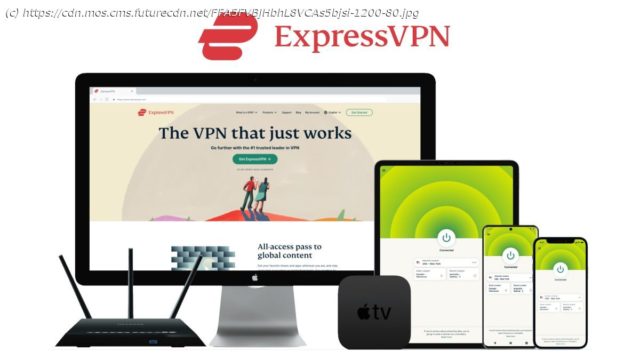ExpressVPN makes setting up your VPN a breeze – the best just keeps on getting better.
The VPN market is a tough one, with a lot of competition around, but ExpressVPN knows exactly how to stand out from the crowd: it piles on the professional features, delivering way more than just about anybody else. Top-notch platform support includes apps for Windows, Mac, Android, iOS, Linux and other operating systems, not to mention custom firmware for many routers, as well as detailed manual setup guides for Apple TV, Fire TV, PlayStation, Chromebooks, Kindle Fire and more. A strong set of core features give you multiple layers of protection. ExpressVPN protects your internet traffic by using its own DNS servers, for instance. High-end encryption technologies prevent even the most advanced attackers from snooping on your activities. Even if the VPN drops, no problem: a top quality kill switch activates immediately to block your internet connection and keep you safe. There are plenty of valuable extras, too, ranging from Lightway (ExpressVPN’s own super-fast and secure VPN protocol) to browser extensions which include WebRTC leak blocking, location spoofing and HTTPS Everywhere support. The company offers a vast network of more than 3,000 servers spread across 160 cities in 94 countries. Europe and the US have the best coverage, but ExpressVPN also has many locations in Asia and several countries that rarely appear elsewhere. There are 27 Asia Pacific countries alone, for instance – TunnelBear only has 34 countries in its entire network. A clear and simple privacy policy explains that ExpressVPN doesn’t log any sensitive information. And unlike most of the competition, this isn’t some generic marketing promise – the website goes into great detail on exactly what the service does and doesn’t collect. Furthermore, ExpressVPN has recently had its servers audited to confirm that the company is following its own privacy policy. The real standout feature could be support, though, where ExpressVPN has agents available 24/7 on live chat. This isn’t the very basic, outsourced, first-line support you’ll often get with other services: they’re experts who can walk you through just about any technical issue. If you run into trouble, then, you won’t be waiting a day (or potentially longer) for a support response. In our experience, there’s always someone available on ExpressVPN’s live chat, and you could be getting quality help within a couple of minutes. There’s good news since our last review, as ExpressVPN’s Android app has been certified by the ioXt Alliance, a group of leading tech companies which includes Amazon, Google, Facebook, Comcast and more. The Alliance is mostly focused on setting standards for IoT security, but it’s now looking at VPN apps, too. And in some detail, with certification considering factors like cryptography, network security, software updating, and even whether there’s a vulnerability reporting program in place. We’ll look at this some more in the Privacy section below. App improvements include a new Android look, with extra features including a Protection Summary to show the amount of time you’ve used ExpressVPN over the previous week. Updating router firmware can be a very technical process, something we suspect many users will do as little as possible. If that sounds like you, good news: ExpressVPN’s router app can now check for and install any updates on its own, entirely automatically. But if value is top of your priority list, we saved the best for last: sign up for ExpressVPN’s annual deal here and you’ll now get a free year of unlimited Backblaze cloud storage (which costs $60 if bought direct from the Backblaze site). As explained in our dedicated ExpressVPN pricing and deals guide, the provider has a very simple pricing structure with only three plans, and these start with a monthly-billed product for $12.95. That’s not cheap, but CyberGhost, Hotspot Shield and VyprVPN all charge around $13 for their monthly plans, and it’s not far from the $9-$10 charged by most big-name VPNs. Sign up for ExpressVPN’s 6-month plan and the price drops to $9.99 per month. That’s a reasonable discount, and it also gives you more flexibility than you’ll get with some competitors, who don’t offer a 6-month plan at all. The annual plan cuts your costs still further to a monthly equivalent of $8.32, a chunky 35% discount on the monthly subscription. But it’s still substantially more than some of the competition (Private Internet Access asks $3.33 on its annual plan, Windscribe is $4.08), especially if you’re willing to sign up for long periods. Speedify’s three-year plan costs only $3 a month, for instance, while Ivacy currently charges just $2.45 a month on its two-year plan, less than a third of ExpressVPN’s annual rate. When you’re comparing headline prices, though, be sure to check the small print, because ExpressVPN is closer to many competitors than you might realize. For example, many vendors have low prices which increase later. IPVanish looks cheap at $3.75 a month in year one, but doubles on renewal to $7.50. NordVPN starts at $4.92, renews at $9.92. Norton Secure VPN’s 10-device plan starts at $5 a month, then renews at $10, and for a service with far, far less functionality. There’s more to a VPN than price, of course. Anyone can offer low headline rates; it’s offering a decent service, too, that’s the tricky part. There are ways to save some cash, as well. Signing up with our exclusive deal adds three free months to the annual ExpressVPN subscription, giving you 15 months of service for an effective $6.67 per month. If you decide to sign up you’ll discover a wide range of payment methods, including cards, PayPal, Bitcoin, and a host of other players (AliPay, Yandex Money, WebMoney and more). If you’re not quite convinced, installing the Android or iOS app gets you a 7-day trial. And even after handing over your cash, ExpressVPN’s 30-day money-back guarantee allows you to safely check out the service for yourself. If you decide you want to cancel, it’s also very straightforward. There are no small print clauses to catch you out, and you don’t have to justify your decision to the company. You can use the service, in full, for 30 days, and if you’re unhappy, or you simply change your mind, just tell ExpressVPN and you’ll get your money back. That has to be a reassuring sign of just how confident ExpressVPN is in its service. Every VPN claims to offer complete privacy, but drill down to the details and there’s often very little substance to back this up. ExpressVPN is refreshingly different, because the company doesn’t just tell you how great it is – it also has an impressively lengthy list of features to help justify every word. Take encryption, for instance. Most services might mention that they support OpenVPN, or drop in a reference to AES-256, but ExpressVPN goes much, much further. The company explains that it uses a 4096-bit SHA-512 RSA certificate, for example, with AES-256-CBC to encrypt its control channel and HMAC (Hash Message Authentication Code) protecting against regular data being altered in real-time. To confirm this, we examined ExpressVPN’s configuration files for OpenVPN, and the details were just as the company had described. Support for Perfect Forward Secrecy adds another layer of protection by automatically assigning you a new secret key every time you connect, and then replacing it every 60 minutes while the session remains open. Even if an attacker has somehow managed to compromise your system, the very most they’ll get is 60 minutes of data. DNS support is another highlight. ExpressVPN doesn’t just offer DNS leak protection, to prevent data about your online activities leaking out of the VPN tunnel, but it also runs its own private, zero-knowledge,256-bit encrypted DNS on each of its own servers. That’s a major advantage over some lesser providers, which in the worst-case scenario might redirect your DNS traffic to OpenDNS or some other third-party service. Apart from the risk of logging at the DNS server, using unencrypted DNS gives attackers the chance to intercept your requests, filter them, block or even alter them – all issues which largely disappear using ExpressVPN’s method. We didn’t test the DNS server in-depth, but websites such as IPLeak, DNS Leak Test and Browser Leaks confirmed that ExpressVPN servers were using the IP address for their DNS queries, and none of them had any DNS or traffic leaks. ExpressVPN’s new ioXt Alliance certification adds even more privacy reassurance, and is interesting for a couple of reasons. The certification process scores the company on several low-level technical design details, including cryptography, network security, the software building process, automatic updates and more. For example, it checks that the app stores its private keys in the secure operating keystore rather than via some custom scheme of its own, an indicator of a secure design and something that would take a lot of time and expertise to check for yourself. Even if you don’t have the background knowledge to interpret these details (that’s okay, we struggle with some of them too), it’s reassuring to see the company expose itself to this kind of technical scrutiny. Private Internet Access and NordVPN are also certified, and hopefully others will join these providers soon. Check out the typical VPN website and you’ll usually find ‚NO LOGGING!‘ claims prominently displayed in a very large font, but often behind that there is a privacy policy which either gives you very little details on any specifics, or reveals that the company does log some of your information, after all. ExpressVPN does things a little differently. The front page of the website doesn’t have any ‚zero log‘ boasting, for instance, and you have to head off to a ‚What Is VPN‘ page to get a first look at the company’s position: ‚Privacy is a fundamental right. We don’t keep connection or activity logs, and we never share your details with anyone.‘ If you need more, the company doesn’t force you to go hunting for the relevant details amongst 2,000 words of jargon-packed small print. Just clicking a link within the ’no log‘ statement takes you to a clearly written ‚Policy towards logs‘ page which explains what ExpressVPN collects, what it doesn’t, why the service works this way, and what it means for users. The page states that the service doesn’t keep any logs of your IP address when you connect to ExpressVPN, or of the time you’ve logged in, the VPN IP address you’re assigned, or any information on the websites or pages you’re visiting (including via DNS requests), or any of your traffic. There is still some logging. The company records each date of when you connect to the service, and your choice of server. But as it doesn’t store the connection time, or the IP address you’re allocated, there’s no way anyone can use this data to definitively link an internet action back to a specific ExpressVPN account. The company also records the version number of any clients you’ve installed, along with the total amount of data you’ve transferred each day. This data also doesn’t constitute any kind of privacy risk, and we’ve no doubt that other VPNs do similar things: they just don’t admit it. ExpressVPN is based in the British Virgin Islands. Despite its small size, the BVI regulates its own affairs and the UK and US don’t have jurisdiction to automatically compel ExpressVPN to release any data.






